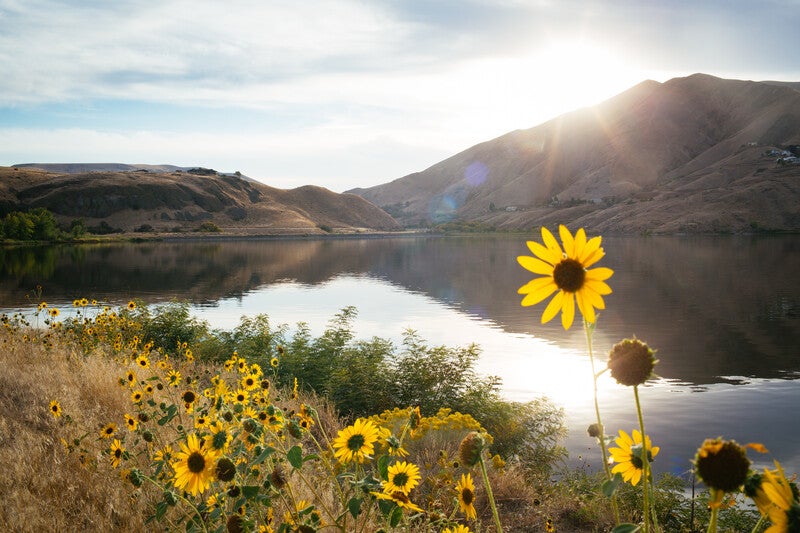Oregon’s U.S. District Court Approves Long-Term Pause of Snake River Litigation, Allowing Columbia River Restoration to Move Forward
Judge rejects requests by opponents to disapprove agreement
Contact
A federal judge in Oregon today approved a long-term pause in Snake River litigation. The ruling by Judge Michael Simon means a tribal-state plan and U.S. government commitments to restore the Columbia River Basin will continue as planned and announced in December.
“This is great news allowing our collaborative work to advance Columbia River restoration to move forward,” said Earthjustice Senior Attorney Amanda Goodin. “We have agreed to pause our litigation for five and up to 10 years to work in partnership to restore the Columbia Basin. With salmon on the brink of extinction, this new approach is desperately needed. We’re grateful to the Biden administration for helping us chart this new path forward.”
The restoration work, based on the Columbia Basin Restoration Initiative (CBRI) proposed by four Columbia Basin Tribes (Nez Perce, Yakama, Umatilla, and Warm Springs) and the states of Oregon and Washington, includes U.S. commitments totaling more than $1 billion in federal funding. The agreement includes measures to protect and restore Columbia and Snake River salmon, steelhead, and other native fish populations along with strategies and funding to replace the energy, transportation, irrigation, and recreation services provided by the four lower Snake River dams, paving the way for dam breaching.
The region will benefit significantly both ecologically and economically by replacing the lower Snake River dams’ services with more robust, resilient, and reliable energy, transportation, and irrigation systems and by restoring healthy and abundant salmon and other fisheries. The federal government has already committed significant funding for Columbia Basin restoration, with commitments to work to secure further funding in the months and years to come.
“This landmark agreement, based on a plan developed by Tribes and States, offers critical forward momentum after more than 25 years of litigation,” said Sierra Club Snake/Columbia River Salmon Campaign Director Bill Arthur. “Restoring these fisheries is essential for honoring Tribal Treaty rights but will also benefit the entire region.”
“This plan and the accompanying federal commitments will allow the Pacific Northwest to modernize energy services while restoring Columbia and Snake River fish and meeting our climate goals,” said Nancy Hirsh, executive director of the NW Energy Coalition. “This agreement offers tremendous opportunity for Northwest communities, Tribes and our fisheries. We’re excited to see this moving forward.”
The joint motion approved today pauses litigation that had challenged flawed dam operations on the Columbia Basin for failing to protect endangered Snake River salmon and steelhead. The litigation stay was requested by a coalition of fishing, conservation and renewable energy groups, represented by Earthjustice, along with the States of Oregon and Washington, four Columbia Basin tribes — the Confederated Tribes and Bands of the Yakama Nation, the Confederated Tribes of the Umatilla Indian Reservation, the Confederated Tribes of the Warm Springs Reservation of Oregon and the Nez Perce Tribe — and federal defendants in the case.
Earthjustice represents National Wildlife Federation, Sierra Club, Northwest Sportfishing Industry Association, Northwest Energy Coalition, Idaho Conservation League, Idaho Rivers United, Columbia Riverkeeper, the Pacific Coast Federation of Fishermen’s Associations, Institute for Fisheries Resources, and Fly Fishers International. The Nez Perce Tribe and the State of Oregon are also aligned with these groups in litigation. A broad group of supporters and advocates are pushing to restore the Snake River and save wild salmon.
The groups that opposed the litigation stay include the State of Idaho, the Public Power Council and the Inland Ports and Navigation Group.

Additional Resources
About Earthjustice
Earthjustice is the premier nonprofit environmental law organization. We wield the power of law and the strength of partnership to protect people's health, to preserve magnificent places and wildlife, to advance clean energy, and to combat climate change. We are here because the earth needs a good lawyer.